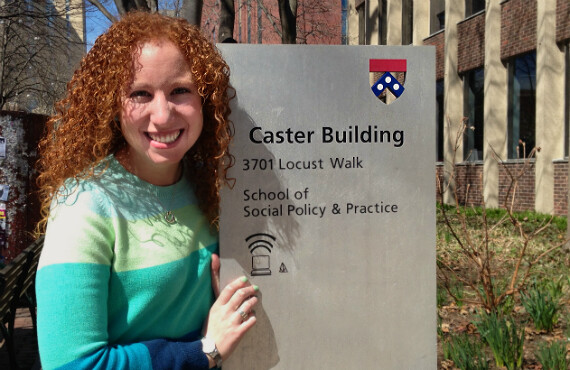Penn Student Makes a Healthy Difference for Neighbors in West Philadelphia
Adina Weissman, a student in the University of Pennsylvania School of Social Policy & Practice, always knew that she wanted to help people, she just didn’t know in what capacity.
Over time, Weissman, who grew up in Houston, realized that a career in social work would allow her to help people overcome obstacles.
“Social workers exist wherever there is a need for professional help to alleviate social or personal problems,” Weissman says. “They can be found in policy, community organizing, research and other fields, working to lessen problems such as poverty, mental health issues, homelessness, substance abuse and post-traumatic stress disorder.”
One of the reasons why Weissman chose Penn, after graduating from Brandeis University in 2012 with a double major in psychology and economics, was the School of Social Policy & Practice’s holistic, interdisciplinary outlook, along with a strong field-placement program.
As a part of their required fieldwork, students at the School deliver nearly 200,000 hours of community service each year at agencies and organizations in the region.
Weissman’s field assignment is serving as the social work intern at Sayre Health Center in West Philadelphia. As a first-year social work student, she says that the skills she has developed at Penn have helped her to feel more comfortable in talking to different people and agencies during the planning process, new skills that enable her to make a difference for those in the community.
Her duties at the health center entail helping people with medical assistance applications, connecting clients with available resources and services, conducting research and working with a weekly counseling group at a nearby adult-care facility. Along with fellow student Kristen Smith, Weissman is also responsible for organizing the second annual Sayre Health Center Community Health Fair, in conjunction with Community TeamWorks.
Weissman says that working with multiple clients in her field placement and having a full course load each semester has helped enhance her organizational skills. These skills were essential in planning the health fair, which offers free eye exams and dental screenings, as well as activities for children. This year’s fair on Saturday, April 5, will also feature opportunities to discuss preventive health subjects, finance, mental and behavioral health, men’s health, nutrition and fitness.
Through the field placement, Weissman has developed a sense of self-awareness and learned to view people through their strengths and abilities, rather than through their diagnoses or weaknesses.
“Everyone has strengths, whether they are aware of it or not, and I have learned to focus on teasing out those strengths when interacting with others,” she says. “I have become comfortable working with diverse populations and learned how easy relating to someone else is and how at ease it puts someone.”
In addition to her coursework and field placement, Weissman volunteers as the social work coordinator for the Heart Health Bridge to Care, a hypertension clinic within the United Community Clinic, a student-run free clinic on Monday nights in East Parkside. She also serves as co-president of the Jewish Social Worker Alliance.
In 2015, Weissman will graduate from the School of Social Policy & Practice with a master’s degree in both social work and social policy.
“Many social work programs focus only on one degree,” Weissman says. “However, the Masters of Social Work program and the many degrees offered here allow for classes on a wide range of topics and take a more interdisciplinary view of social work, which I really like.”
She plans to declare a clinical concentration in the M.S.W. program and hopes to use those skills working one-on-one with people in direct practice one day. While she hasn’t decided yet on which population she wants to work with, she is interested in working with at-risk adolescents, people in trauma or those who are engaging in substance abuse.
Weissman also plans to use her social policy degree to make the transition from a clinical role to a position that addresses policy changes or program evaluations. She wants to help people on an individual basis, but she also wants to improve the system and the environments that foster broader social issues.
“A rough analogy,” says Weissman, “is that as a direct practitioner, I would be helping people who have tripped on a cracked sidewalk, and then I want to repave the sidewalk so that people are less likely to fall at all.”








